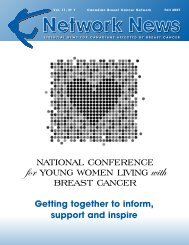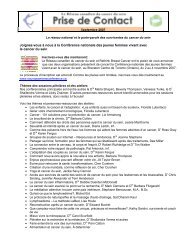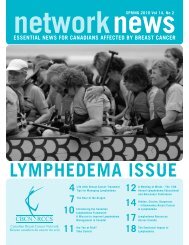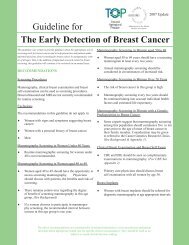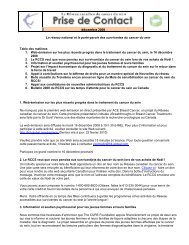Network News - Winter/Spring 2010 - Canadian Breast Cancer ...
Network News - Winter/Spring 2010 - Canadian Breast Cancer ...
Network News - Winter/Spring 2010 - Canadian Breast Cancer ...
You also want an ePaper? Increase the reach of your titles
YUMPU automatically turns print PDFs into web optimized ePapers that Google loves.
Other Risks<br />
Rare families with BRCA1/2 mutations<br />
may report an increased incidence of<br />
pancreatic cancer and melanoma.<br />
Inheritance<br />
BRCA1 or BRCA2 mutations are<br />
inherited in an autosomal dominant<br />
pattern. That is, an individual who<br />
carries one of these mutations has a<br />
50% risk of passing it on to any child,<br />
whether the child is male or female.<br />
Monitoring in Individuals with a<br />
BRCA1 or BRCA2 mutation<br />
Note: May be modified for previous<br />
surgery/treatment and current health<br />
status<br />
1. Monthly self-breast exam<br />
(including males), from age 18<br />
2. Twice yearly physician breast<br />
exam (including males), from age<br />
25<br />
3. Yearly mammogram, from age<br />
25-30. This can also be done on<br />
males with breast enlargement<br />
(gynecomastia). Based on the<br />
mammogram, the radiologist<br />
may recommend ultrasound<br />
and/or MRI to some individuals<br />
4. Twice yearly pelvic exam<br />
with CA-125 measurement<br />
and transvaginal ultrasound<br />
for females, from age 35.<br />
Unfortunately, this screening has<br />
many false positives and false<br />
negatives<br />
5. Yearly digital rectal exam and<br />
PSA measurement for males,<br />
from age 50<br />
6. Other screening as indicated by<br />
family history<br />
Prevention –<br />
Surgery and Chemoprevention<br />
The program is designed to offer cancer risk assessment,<br />
genetic counselling and, when appropriate, arrange genetic<br />
testing in patients at high risk for hereditary cancer (cancer<br />
associated with mutations in known cancer susceptibility genes).<br />
Contact:<br />
By Phone: (780) 407-7333<br />
By Fax: (780) 407-6845<br />
By Mail: Medical Genetics Clinic<br />
University of Alberta<br />
8-53 Medical Sciences Building<br />
Edmonton, Alberta T6G 2H7<br />
Consideration of preventive<br />
(prophylactic) bilateral total<br />
mastectomy, with or without<br />
reconstruction, may be considered<br />
by women with BRCA1 or BRCA2<br />
mutations. This reduces the risk<br />
of breast cancer by up to 90%.<br />
Prophylactic oophorectomy (removal<br />
of the ovaries) should be considered<br />
by women with BRCA1 or BRCA2<br />
mutations, ideally between the<br />
ages of 35-40, or upon completion<br />
of child-bearing. The risk for<br />
breast cancer is reduced by up to<br />
50% by oophorectomy in the 30’s.<br />
Oophorectomy, at any age, reduces<br />
the risk for ovarian cancer by up to<br />
95%. The remaining risk is for primary<br />
peritoneal carcinomatosis (cancer of<br />
the lining of the pelvic cavity).<br />
As most BRCA1 tumours are hormone<br />
receptor negative, it is unlikely that<br />
the prophylactic use of Tamoxifen or<br />
Raloxifene would be of benefit. Most<br />
BRCA2 tumours are estrogen receptor<br />
positive. Therefore, the prophylactic<br />
use of Tamoxifen or Raloxifene may<br />
be of benefit to carriers of BRCA2<br />
mutations, particularly if they are post-<br />
menopausal. This should be discussed<br />
with the family doctor, gynecologist or<br />
oncologist. •<br />
References<br />
National Comprehensive <strong>Cancer</strong> <strong>Network</strong><br />
(www.nccn.org).<br />
Meta-Analysis of BRCA1 and BRCA2<br />
Penetrance. J Clin Onc 25(11):<br />
1329-1333, 2007.<br />
Dr. Dawna M. Gilchrist, M.D., FRCPC,<br />
FCCMG, DHMSA; has been on staff with<br />
the Faculty of Medicine and Dentistry at<br />
the University of Alberta (UofA) since<br />
1990. Currently, she is a Clinician-<br />
Teacher for UofA’s Department of Medical<br />
Genetics and is an Adjunct Professor for<br />
both the Department of Medicine and<br />
the Department of Pediatrics. She also<br />
serves as the Director for the university’s<br />
History of Medicine Program. Dr.<br />
Gilchrist first attended the University of<br />
Alberta, graduating in 1972 in Biology,<br />
and then continued there to obtain her<br />
BSc. Specialization in Genetics (1979) and<br />
M.D. (1983). Additionally, she received<br />
her diploma in the history of medicine from<br />
the Society of Apothecaries in London, UK<br />
(2002). Dr. Gilchrist’s areas of expertise<br />
include genetic disorders of adult onset;<br />
particularly, genetic cancer, inherited<br />
disorders of connective tissue and inherited<br />
neurodegenerative disorders. She is a<br />
fellow of the <strong>Canadian</strong> College of Medical<br />
Geneticists.<br />
In Edmonton, How to Obtain Referral to the<br />
Edmonton <strong>Cancer</strong> Genetics Clinic<br />
Clinic Protocol<br />
1. Referral (letter preferred) by specialist or primary<br />
care physician to the <strong>Cancer</strong> Genetics Clinic.<br />
2. Preliminary workup by us – pedigree construction<br />
and obtaining/reviewing medical records.<br />
3. Appointment made with patient/family.<br />
4. First appointment. Contents to include: assessment of<br />
hereditary cancer risk in patient/family; discussion of<br />
potential molecular testing including risks/benefits/<br />
limitations; recommendations for clinical management.<br />
Letter sent to patient(s), referring physician, and other<br />
physician(s) as designated by patient.<br />
12 <strong>Network</strong> <strong>News</strong> <strong>Winter</strong>/<strong>Spring</strong> <strong>2010</strong>






